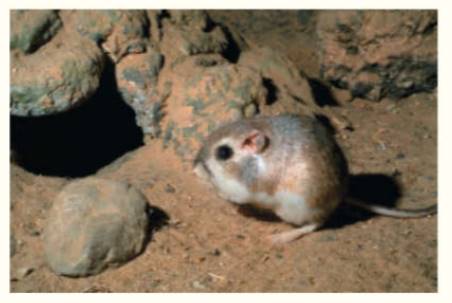
EP CONCEPTUAL INTEGRATED SCIENCE-ACCESS
3rd Edition
ISBN: 9780135213346
Author: Hewitt
Publisher: PEARSON CO
expand_more
expand_more
format_list_bulleted
Concept explainers
Textbook Question
Chapter 15, Problem 93TE
Some animals that live in desert environments, such as this kangaroo rat, never drink water. Kangaroo rats live entirely on the starches and lipids in the dry seeds they eat. Yet we know that all living organisms need water, and, in fact, the bodies of kangaroo rats have about the same water content as those of other animals. How do kangaroo rats get their water?

Expert Solution & Answer
Want to see the full answer?
Check out a sample textbook solution
Students have asked these similar questions
According to a grade 11 Physics SPH3U course Kinematics, Dynamics, and Energy answer the following question
According to a grade 11 Physics SPH3U course Kinematics, Dynamics, and Energy answer the following question
According to a grade 11 Physics SPH3U course Kinematics, Dynamics, and Energy answer the following question
Chapter 15 Solutions
EP CONCEPTUAL INTEGRATED SCIENCE-ACCESS
Ch. 15 - What are some of the characteristics of living...Ch. 15 - Describe what it means to say that living things...Ch. 15 - What are some examples of prokaryotes? What are...Ch. 15 - Describe three or more differences between...Ch. 15 - How is the DNA of prokaryotes packaged differently...Ch. 15 - What is the nucleus of a cell.Ch. 15 - Describe the functions of the following...Ch. 15 - What are three components of the cell membrane?Ch. 15 - Prob. 9RCCCh. 15 - Prob. 10RCC
Ch. 15 - Prob. 11RCCCh. 15 - What is the difference between diffusion and...Ch. 15 - Prob. 13RCCCh. 15 - How do endocytosis and exocytosis move materials...Ch. 15 - Prob. 15RCCCh. 15 - Describe what happens when a message molecule...Ch. 15 - Prob. 17RCCCh. 15 - What are the stages of cell cycle? What happens...Ch. 15 - Prob. 19RCCCh. 15 - What are the end products of mitosis?Ch. 15 - Prob. 21RCCCh. 15 - Prob. 22RCCCh. 15 - Prob. 23RCCCh. 15 - Prob. 24TISCh. 15 - Give an example of a a carbohydrate that functions...Ch. 15 - Describe the structure of DNA.Ch. 15 - Explain this statement: Proteins, carbohydrates,...Ch. 15 - Prob. 28TISCh. 15 - Why are electron microscopes particularly useful...Ch. 15 - Prob. 30TISCh. 15 - Prob. 31TISCh. 15 - Prob. 32TISCh. 15 - Prob. 33TISCh. 15 - Prob. 34TISCh. 15 - Prob. 35TISCh. 15 - Prob. 36TISCh. 15 - Prob. 37TISCh. 15 - Prob. 38TISCh. 15 - Prob. 39TISCh. 15 - Rank these three living things from largest to...Ch. 15 - Prob. 44TCCh. 15 - Prob. 45TCCh. 15 - Prob. 46TSCh. 15 - A typical cell in the body makes about 10 million...Ch. 15 - Prob. 48TSCh. 15 - Prob. 49TSCh. 15 - How can you tell a plant is alive even though it...Ch. 15 - What are some features of living organisms?...Ch. 15 - Bacteria reproduce by dividing in two. Is this an...Ch. 15 - Prob. 53TECh. 15 - Prob. 54TECh. 15 - Prob. 55TECh. 15 - DNA uses only four different kinds of nucleotides....Ch. 15 - Are your cells more like those of yeasts or those...Ch. 15 - You look at a cell under a microscope and discover...Ch. 15 - You hike near a pond, where you find strands of...Ch. 15 - Prob. 60TECh. 15 - What kind of microscope could you use to look at...Ch. 15 - How are a cells cytoskeleton and organelles like a...Ch. 15 - What organelle is found only in plants? What does...Ch. 15 - Prob. 64TECh. 15 - How is the function of a cell wall different from...Ch. 15 - Prob. 66TECh. 15 - Why is the cell membrane called a fluid mosaic?Ch. 15 - Prob. 68TECh. 15 - Prob. 69TECh. 15 - Prob. 70TECh. 15 - Prob. 71TECh. 15 - Prob. 72TECh. 15 - Prob. 73TECh. 15 - Prob. 74TECh. 15 - Message molecules and their receptors are...Ch. 15 - Prob. 76TECh. 15 - Prob. 77TECh. 15 - Prob. 78TECh. 15 - The deadly nerve gas sarin binds to an enzyme...Ch. 15 - Prob. 80TECh. 15 - Prob. 81TECh. 15 - Prob. 82TECh. 15 - Prob. 83TECh. 15 - Prob. 84TECh. 15 - Prob. 85TECh. 15 - Prob. 86TECh. 15 - Prob. 87TECh. 15 - Why cant you live without oxygen?Ch. 15 - What are some differences between fermentation and...Ch. 15 - You visit a friend who is a winemaker. Some of his...Ch. 15 - Prob. 92TECh. 15 - Some animals that live in desert environments,...Ch. 15 - Prob. 94TDICh. 15 - A friend in your class is reading about cells that...Ch. 15 - You and your friend are eating lunch in the...Ch. 15 - Prob. 97TDICh. 15 - Prob. 98TDICh. 15 - Prob. 1RATCh. 15 - Prob. 2RATCh. 15 - Prob. 3RATCh. 15 - Prob. 4RATCh. 15 - Prob. 5RATCh. 15 - Prob. 6RATCh. 15 - Prob. 7RATCh. 15 - Prob. 8RATCh. 15 - Prob. 9RATCh. 15 - Which of the following processes requires oxygen?...
Knowledge Booster
Learn more about
Need a deep-dive on the concept behind this application? Look no further. Learn more about this topic, physics and related others by exploring similar questions and additional content below.Similar questions
- Three point-like charges in the attached image are placed at the corners of an equilateral triangle as shown in the figure. Each side of the triangle has a length of 38.0 cm, and the point (C) is located half way between q1 and q3 along the side. Find the magnitude of the electric field at point (C). Let q1 = −2.80 µC, q2 = −3.40 µC, and q3 = −4.50 µC. Thank you.arrow_forwardThree point-like charges are placed as shown in the attach image, where r1 = r2 = 44.0 cm. Find the magnitude of the electric force exerted on the charge q3. Let q1 = -1.90 uC, q2 = -2.60 uC, and q3 = +3.60 uC. Thank you.arrow_forwardThe drawing attached shows an edge-on view of two planar surfaces that intersect and are mutually perpendicular. Surface (1) has an area of 1.90 m², while Surface (2) has an area of 3.90 m². The electric field in magnitude of 215 N/C. Find the magnitude of the electric flux through surface (1 and 2 combined) if the angle theta made between the electric field with surface (2) is 30.0 degrees. Thank you.arrow_forward
- A car driving at 27m/s veers to the left to avoid a deer in the road. The maneuver takes 2.0s and the direction of travel is altered by 20 degrees. What is the average acceleration during the constant speed maneuver? Do this in accordance with the example in the chapter.arrow_forwardNo No No Chatgpt pls will upvotearrow_forward2 C01: Physical Quantities, Units and Measurementscobris alinu zotinUD TRO Bendemeer Secondary School Secondary Three Express Physics Chpt 1: Physical Quantities, Unit and Measurements Assignment Name: Chen ShiMan loov neowled soria 25 ( 03 ) Class: 3 Respect 6 Date: 2025.01.22 1 Which group consists only of scalar quantities? ABCD A acceleration, moment and energy store distance, temperature and time length, velocity and current mass, force and speed B D. B Which diagram represents the resultant vector of P and Q? lehtele 시 bas siqpeq olarist of beau eldeo qirie-of-qi P A C -B qadmis rle mengaib priwollot erT S Quilons of qira ono mont aboog eed indicator yh from West eril to Inioqbim srij enisinoo MA (6) 08 bas 8A aldao ni nolent or animaleb.gniweb slepe eld 260 km/h D 1 D. e 51arrow_forward
- The figure gives the acceleration a versus time t for a particle moving along an x axis. The a-axis scale is set by as = 12.0 m/s². At t = -2.0 s, the particle's velocity is 11.0 m/s. What is its velocity at t = 6.0 s? a (m/s²) as -2 0 2 t(s) 4arrow_forwardTwo solid cylindrical rods AB and BC are welded together at B and loaded as shown. Knowing that the average normal stress must not exceed 150 MPa in either rod, determine the smallest allowable values of the diameters d₁ and d2. Take P= 85 kN. P 125 kN B 125 kN C 0.9 m 1.2 m The smallest allowable value of the diameter d₁ is The smallest allowable value of the diameter d₂ is mm. mm.arrow_forwardWestros, from Game of Thrones, has an area of approximately 6.73⋅106 miles26.73⋅106miles2. Convert the area of Westros to km2 where 1.00 mile = 1.609 km.arrow_forward
- a) What is the lenght of x? b) Findθ c) Find ϕarrow_forwardA surveyor measures the distance across a straight river by the following method: Starting directly across from a tree on the opposite bank, he walks x = 97.7 m along the riverbank to establish a baseline. Then he sights across to the tree. The angle from his baseline to the tree is θ = 33.0 °. How wide is the river?arrow_forwardA small turtle moves at a speed of 697. furlong/fortnight. Find the speed of the turtle in centimeters per second. Note that 1.00 furlong = 220. yards, 1.00 yard = 3.00 feet, 1.00 foot = 12.0 inches, 1.00 inch = 2.54 cm, and 1.00 fortnight = 14.0 days.arrow_forward
arrow_back_ios
SEE MORE QUESTIONS
arrow_forward_ios
Recommended textbooks for you

 Foundations of Astronomy (MindTap Course List)PhysicsISBN:9781337399920Author:Michael A. Seeds, Dana BackmanPublisher:Cengage Learning
Foundations of Astronomy (MindTap Course List)PhysicsISBN:9781337399920Author:Michael A. Seeds, Dana BackmanPublisher:Cengage Learning Stars and Galaxies (MindTap Course List)PhysicsISBN:9781337399944Author:Michael A. SeedsPublisher:Cengage Learning
Stars and Galaxies (MindTap Course List)PhysicsISBN:9781337399944Author:Michael A. SeedsPublisher:Cengage Learning
 Stars and GalaxiesPhysicsISBN:9781305120785Author:Michael A. Seeds, Dana BackmanPublisher:Cengage Learning
Stars and GalaxiesPhysicsISBN:9781305120785Author:Michael A. Seeds, Dana BackmanPublisher:Cengage Learning Horizons: Exploring the Universe (MindTap Course ...PhysicsISBN:9781305960961Author:Michael A. Seeds, Dana BackmanPublisher:Cengage Learning
Horizons: Exploring the Universe (MindTap Course ...PhysicsISBN:9781305960961Author:Michael A. Seeds, Dana BackmanPublisher:Cengage Learning


Foundations of Astronomy (MindTap Course List)
Physics
ISBN:9781337399920
Author:Michael A. Seeds, Dana Backman
Publisher:Cengage Learning

Stars and Galaxies (MindTap Course List)
Physics
ISBN:9781337399944
Author:Michael A. Seeds
Publisher:Cengage Learning


Stars and Galaxies
Physics
ISBN:9781305120785
Author:Michael A. Seeds, Dana Backman
Publisher:Cengage Learning

Horizons: Exploring the Universe (MindTap Course ...
Physics
ISBN:9781305960961
Author:Michael A. Seeds, Dana Backman
Publisher:Cengage Learning
A Level Physics – Ideal Gas Equation; Author: Atomi;https://www.youtube.com/watch?v=k0EFrmah7h0;License: Standard YouTube License, CC-BY